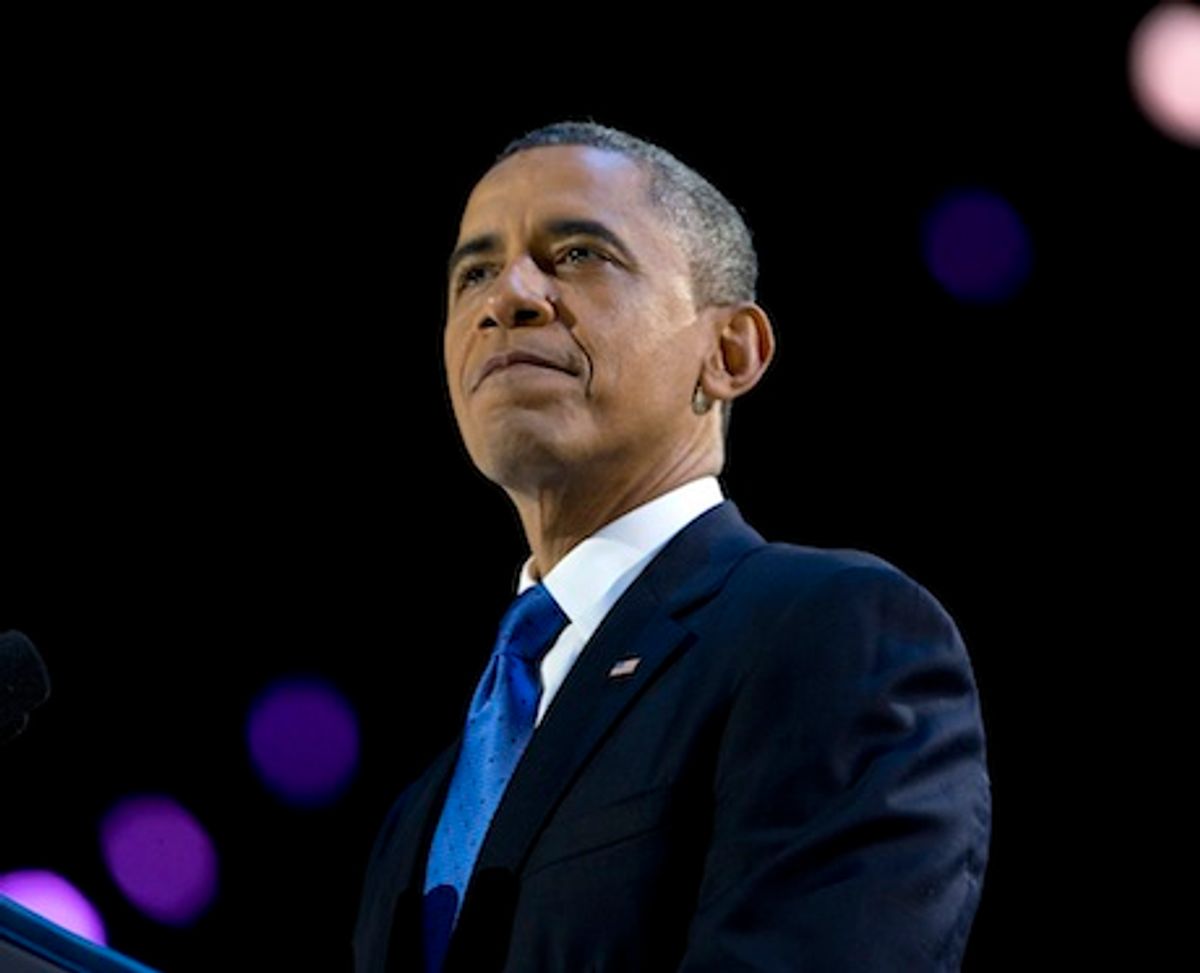Without question, the lowest moment of Barack Obama’s first term came at the end of the summer of 2011, when the public registered its disgust with a totally needless debt ceiling drama that produced a last-minute compromise that seemed to enrage everyone. The fallout crashed Obama’s approval rating to the low-40s, the lowest mark of his presidency and a level dangerously close to where George H.W. Bush – the last one-term president – was in his reelection year.
That nadir, as Steve Benen pointed out Tuesday, was the product of a serious strategic blunder by the White House. In the lame duck session at the end of 2010, Obama’s team had opted not to push for the inclusion of a debt ceiling extension in the tax cut/stimulus package that the president and congressional Republicans agreed to. That allowed the GOP to manufacture a crisis as the August 2 deadline approached, threatening to allow a default unless Obama caved to their demands. Obama was hardly alone in taking a P.R. hit – the Republican Party’s image tanked in the wake of the fiasco too – but he emerged from it with his presidency imperiled.
He learned two lessons from the experience. The first was that meaningful compromise with Republicans in the 112th Congress was impossible. In the run-up to the August deadline, he had pursued a grand bargain with House Speaker John Boehner, an effort that grew out of Obama’s belief that voters had been signaling their desire for bipartisan compromise in the ’10 midterms. But the GOP’s staunch anti-tax absolutism left Boehner powerless to meet Obama halfway, with the Speaker walking away from talk just days before the deadline.
In the wake of this, Obama dedicated the rest of his first term to highlighting the basic philosophical differences that had kept him and Boehner apart and demonstrating how intent the GOP was on obstructing his economic agenda. For the first two-and-half-years of his term, Obama tried to play the role of compromiser-in-chief, straining to win over Republican support for his agenda. It was the debt ceiling showdown that convinced him once and for all that this was a dead end – that he’d have to take his case to the voters in 2012 and hope that they’d send a message that would jar Republicans from their obstinacy.
And there are some tentative signs that this month’s election is having that effect. It’s true that the headlines about Republicans suddenly breaking with Grover Norquist’s anti-tax pledge are overstated, but there is at least some recognition on the right that Obama has real leverage in the current “fiscal cliff” standoff. On Tuesday, for instance, one of the top Republicans in the House urged his colleagues to agree now to Obama’s call for an extension of the Bush rates for the bottom 98 percent of income-earners, and to fight the battle over the low rates on the rich after. Such talk of decoupling by a Republican would have been unthinkable before the election.
So, as Greg Sargent explained Tuesday, it’s not 2011 anymore. Because of the nature of the “cliff” – the tax hikes and spending cuts set to trigger on January 1 are more anathema to the right than the left – and because of his electoral victory, Obama is in position to make demands that he couldn’t make two summers ago. Which brings us to the second lesson that he and his team learned from that experience: Don’t ever hand the GOP an opportunity to use the debt ceiling as a negotiating tool again.
This is why Democrats are now demanding that any fiscal cliff deal include a provision to raise the debt ceiling, which we’re now set to bump up against in early 2013.
“We’re not going to find ourselves at some big party celebrating in February and then turn around in March and have another doomsday scenario with the debt ceiling,” Dick Durbin, a close White House ally and the No. 2 Democrat in the Senate, said Tuesday. “We’ve got to get this done as one big package.”
Durbin’s comments came after word leaked that Boehner told the president that he’d want further concessions to include a debt ceiling increase in any package. Technically, of course, Boehner and Republicans are free to play the same game they did in ’11, but this time the political fallout will be different. Polls already show that voters would blame the GOP much more than Obama if a deal isn’t cut before January 1. And Obama just spent more than a year running for reelection on a promise to insist on … exactly what he’s now insisting on from Republicans. There seems to be some recognition of this among the general public, and the political press.
In other words, if January 1 gets here and there’s still no deal, the public pressure on Republicans to give real ground will be enormous. To then hold out even longer simply because they want to force another confrontation over the debt ceiling a few months later would be politically toxic – and, if it gets to that point, Republicans will probably recognize this.



Shares